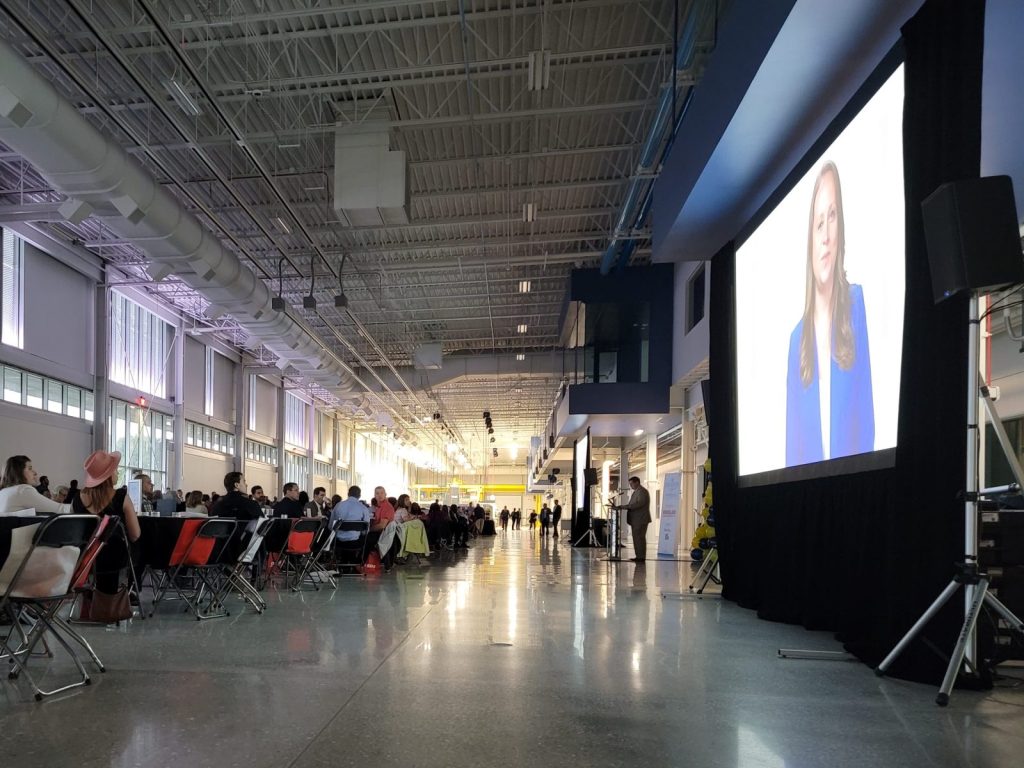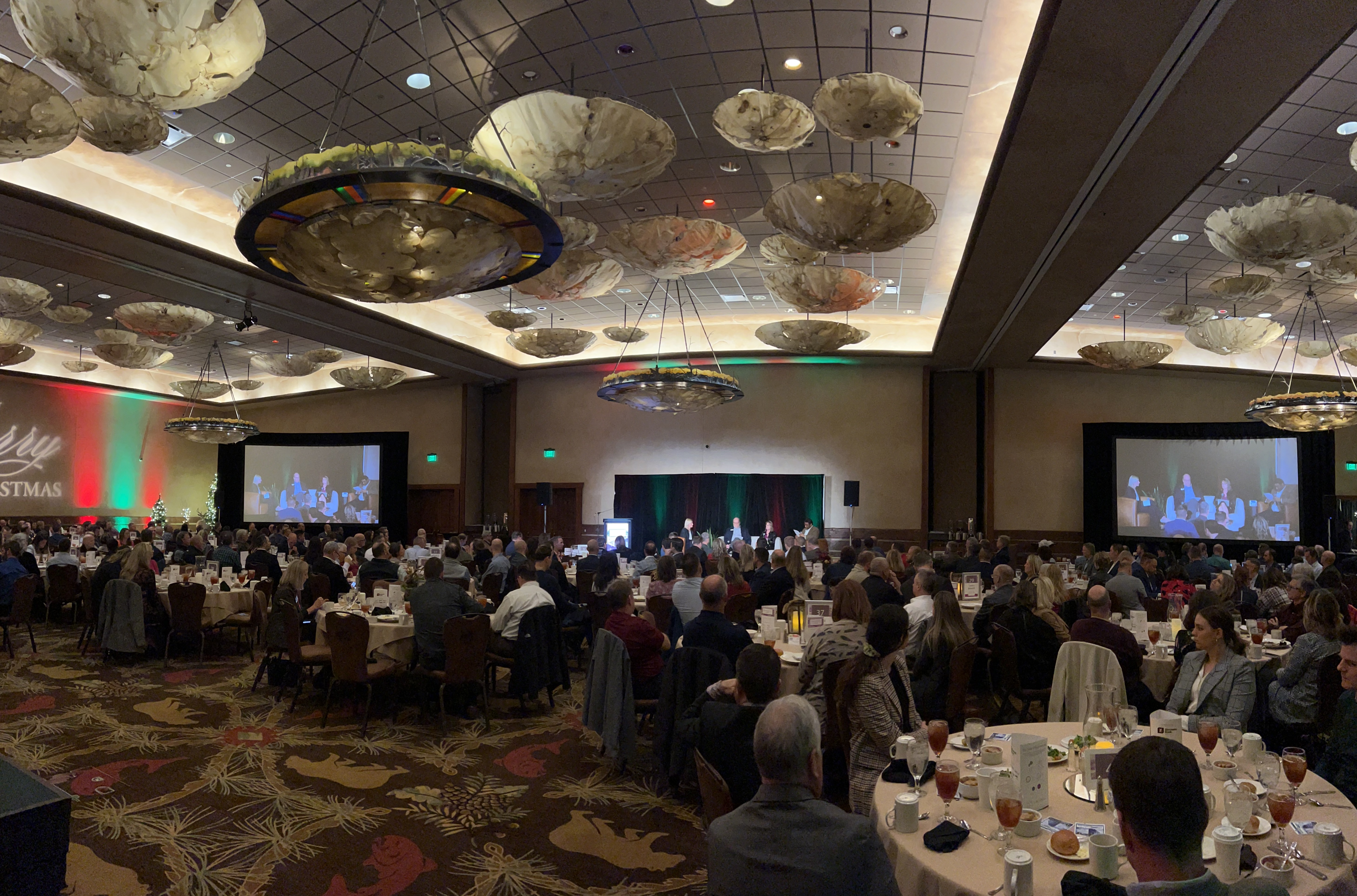A panel of local figures in the manufacturing community headlined the 2022 Springfield Business Development Cooperation Manufacturing Outlook on Wednesday morning.
They highlighted challenges local companies are facing in a post-Covid world, from staffing shortages to meeting employee demands. Leaders also discussed ways they are trying to adapt, their companies' futures and the overall outlook for 2023.
The SBDC, the economic development arm of the Springfield Area Chamber of Commerce, hosted a handful of upper management personnel from notable Springfield companies. They gathered at the White River Conference Center. As the third and final SBDC event of 2022, roughly 450 people were in attendance.
Featured speakers included:
- CFO Christina Angle of the Erlen Group, a holding company that owns several local properties, including the Springfield Underground
- CEO and chairman Kevin Ausburn of the SMC Packaging Group
- Nikki Holden, president of Custom Metalcraft, Inc.
- Reginald Davis, plant manager of The French’s Food Company
Local leaders in the industry discuss solutions, the future at Chamber event
Manufacturing is a vital sector of the Ozarks' overall economy, making up a significant chunk of the total workforce in the 10-county Springfield region.
It represents over 9 percent of the total jobs, over 10 percent of the GDP and has a higher average wage than overall average earnings in the area, according to 2021 data from the Bureau of Labor Statistics and 2020 data from the Bureau of Economic Analysis.
Vicki Pratt, the senior vice president of Economic Development at the Chamber, outlined the challenges these businesses are facing on the workforce attraction and retention front.
She pointed to BLS data from July of this year indicating the country had 10.7 million job openings and that even if each of the 5.7 million people on unemployment in July were employed, there would still be 5 million positions left unfilled.
“When you unpack that data by industry sector, wholesale and retail trade businesses are having the toughest time,” Pratt said. “However, the manufacturing of durable goods has the second highest unfilled job rate in the U.S. As of the end of July, 55 percent of manufacturing job openings remained unfilled in the U.S.”
Despite Missouri being better off than other states when it comes to the labor shortage, access to talent is the most-asked question for prospective investors in the Springfield business community, according to Pratt.
Ausburn, Davis and Holden have all dealt with the blow the Covid-19 pandemic has had — and continues to have — on the manufacturing industry.
“You drive through the industrial park and it just looks like daisies are popping up everywhere with all the signs advertising for employees,” Ausburn said.

Adaptation is the name of the game for manufacturers
They’ve attempted to create flexible schedules, cross-train employees and offer promotion opportunities to employees as ways to adapt to keep up with production and meet some demands of employees. But remote work, which remains in much higher demand than pre-pandemic levels, isn’t as accessible in the manufacturing industry as others.
The Springfield Underground has brought back some retirees for part-time work to help close the gap in their labor shortage, according to Angle, which has been “working well.” However, Angle said that much of the burden often falls on supervisors.
“It’s been clear that…none of us have really found the silver bullet here to solve the labor issue,” Angle said.
SMC Packaging Group, which employs north of 500 people across the Midwest, with the vast majority working in Springfield, has not been immune to the workforce woes and sputtering economy.
Technology brings new opportunities, challenges for some
Additionally, they’ve also had to deal with issues when it comes to properly training new employees with rapidly evolving technology and automation in the workplace.
“We think it's been good from a recruiting standpoint; employees like the idea of working on new equipment, computer controls and more automation, less physical labor, less strain and stress,” Ausburn said. “But it has created some challenges from a training standpoint — getting employees up to speed on operating that equipment.”
Davis and Holden concurred with Ausburn in that technology is beneficial for the worker, but Davis suggested that it was good from a training perspective, rather than challenging.
“It bridges the time it takes us — what was a year to make up a French’s employee, we think now it takes about a month, and in three months, they’re doing pretty good stuff,” Davis said. “Absolutely do not take your kids off Xbox or any of those…we’re putting those to use.”
Davis also emphasized that, at least when it comes to French’s, people shouldn’t fear robots taking peoples’ jobs, because even with their evolving technology they still need the same amount of humans to operate.
“They’re faster than people, but they’re still not smarter than people,” he said. “So I wouldn’t be afraid of the automation that’s coming or whether we’re going to have less jobs. We’re just going to be more productive overall.”
Davis also noted that these changes workplaces are having to make to keep up with employee demands weren’t just for young people, and that everybody wants better working conditions and “we should all support that.”
Accepting short-term pains for long-term gains
Despite the concerns of these Springfield manufacturing executives, they each expressed cautious optimism for 2023 and beyond.
Holden is prepared for a potentially rough start to 2023 from an economic standpoint, and said that some of their costs that have either dropped or stabilized were likely to go back up. However, she suggested the short-term outlook won’t hinder them from investing in long-term goals.
“We’re going to take a more active stance in searching out new markets,” Holden said. “We’re actually going to be a little bit more aggressive about this post-Covid world and getting back out there, attending some of the trade shows, doing some of the things we haven’t done before, and make a larger investment in retaining the employees that we’ve got.”
Even though they’ve had a “record year,” SMC Packaging Group has been less robust in each quarter of this year and are actually down on a volume measurement in terms of square footage produced and sold compared to last year, according to Ausburn.

However, even with the expectation that things could get worse before they get better, Ausburn said that they’ve lost perspective and noted that their numbers were still up significantly compared to 2019.
“We’re still optimistic long-haul,” Ausburn said. “We’re probably going to see some softness, probably a recession in early 2023, maybe the first half of the year. But again, we’re still bullish long-term.”
Like Ausburn, Davis is cognizant of the possibility of a recession and that they aren’t quite out of the woods yet.
“Well, for 2023 We don't think that it's going to get any easier,” Davis said. “We’re hearing our workforce and our leadership team understand that the difficulties and the hard work that we had and we did in 2022 are going to continue.”
Despite the foggy outlook, Davis remains confident in their future overall due to the innovative steps French’s is taking to adapt to a changing manufacturing industry – and a changing world.
“We're trying to be specific about efficiency and reliability,” he said. “We’re not sitting here anymore, we’re wondering how to double up, take big, hairy, audacious goals from good to great and how we do that.”

